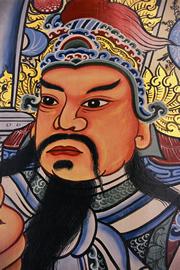 The Manchu warriors took control of China in 1644.© Punchstock
The Manchu warriors took control of China in 1644.© PunchstockAbout 1.5 million men in northern China and Mongolia may be descended from a single man, according to a study based on Y chromosome genetics1.
Historical records suggest that this man may be Giocangga, who lived in the mid-1500s and whose grandson founded the Qing dynasty, which ruled China from 1644 to 1912.
The analysis is similar to a controversial study in 2003, which suggested that approximately 16 million men alive today are descended from the Mongolian conqueror Genghis Khan2.
“All geneticists know we are living fossils.”
Steve Jones
University College, London
The male descendants of Giocangga, like Khan's sons and grandsons, ruled over vast swathes of land, living a lavish existence with many wives and concubines. The study published in this month's American Journal of Human Genetics suggests it was a good strategy for reproductive success.
"This kind of male reproductive advantage is perhaps a more important feature of human genetics than we thought," says Chris Tyler-Smith, at the Wellcome Trust Sanger Institute in Hinxton, UK, who led both studies.
Fossilized Y
Documenting the immense fecundity of these conquerors involves overlaying historical records and genetic analyses. Most informative is the small Y chromosome, holed up in the cells of every man, and relatively resistant to change.
Other chromosomes furiously exchange genetic information with each other. But during mating, the Y pairs up with the X, a giant chromosome by comparison and a poor fit for gene swapping. This means that the Y chromosome passes along steadily from father to son through the generations, providing a relatively fixed marker for clues about ancestry.
In the recent analysis, Tyler-Smith and his colleagues in Britain and China examined the Y chromosome of about 1,000 men in eastern Asia. The researchers compared the DNA sequences at numerous locations along the Y chromosome, finding close similarities among 3.3% of the men. That genetic similarity suggests that these men shared a common male ancestor who lived about 600 years ago, give or take a few centuries.
To identify who spawned this prolific Y chromosome, Tyler-Smith and his colleagues turned to their history books. They found Giocangga, whose grandson led the Manchu conquest of China in 1644 and established the Qing dynasty.
A large class of noblemen, descended by law from Giocangga, then ruled the state until 1912. Even a low-rank noble had many concubines, and was presumably expert at spreading Giocangga's chromosome around.
Further supporting Tyler-Smith's theory, the Manchu in the army mixed with only certain ethnic groups, and today these groups have the highest frequency of Giocangga's Y chromosome.
Only Genghis Khan's Y chromosome approaches the prevalence of Giocangga's, popping up in about 2.5% of the men, says Tyler-Smith.
Whose Y?
Getting a precise date for the origin of the chromosome is difficult, say geneticists, and pinning it to a historical figure is even less exact.
"But all geneticists know we are living fossils," says Steve Jones of University College London, who adds that the Giocangga hypothesis is "not unreasonable". Martin Richards, a human geneticist at the University of Leeds, UK, says that Tyler-Smith's analysis showing a common origin for the Y chromosome is among the most thorough he has seen.
However, others dispute the findings. The date for the origin of the Y chromosome is much too wobbly to pin on Giocangga, says Stanford's Luca Cavalli-Sforza. He also disputes the study on Genghis Khan and says both findings are overly sensational.
The investigators could help their case by examining the Y chromosome of known descendents of Giocangga. But that might be easier said than done.
ADVERTISEMENT
Although the noble class had 80,000 members by 1912, the Chinese cultural revolution of the 60s and 70s caused people to hide their noble descent for fear of persecution, and many records were destroyed. Several men today who are known to trace their ancestry back to Giocangga would not yield their DNA, the scientists say.
If this study and the work on Khan are right, they suggest that winning Y chromosomes thrive on hierarchy, patriarchy and conquest. "They tell us that those who regard history as the record of human frailty, weakness and disaster are right," says Jones.
University College, London
-
References
- Xue Y., et al. Am. J. Hum. Genet., 77. published online Abstract (2005).
- Zergal T., et al. Am. J. Hum. Genet., 72. 717 - 721 (2003).
